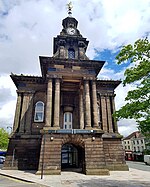Port Vale Football Club are a professional football club based in Burslem, Stoke-on-Trent, England, which compete in EFL League One. Vale are named after the valley of ports on the Trent and Mersey Canal. They have never played top-flight football, and hold the record for the most seasons in the English Football League (112) without reaching the first tier. After playing at the Athletic Ground in Cobridge and The Old Recreation Ground in Hanley, the club returned to Burslem when Vale Park was opened in 1950. Outside the ground is a statue to Roy Sproson, who played 842 competitive games for the club. The club's traditional rivals are Stoke City, and games between the two are known as the Potteries derby.
After becoming one of the more prominent football clubs in Staffordshire, Burslem Port Vale were invited to become founder members of the Football League Second Division in 1892. They spent 13 non-consecutive seasons in the division, punctuated by two seasons in the Midland League, before they resigned due to financial difficulties and entered liquidation in 1907. The name of Port Vale continued in the North Staffordshire Federation League, and this new club was successful enough to be reinstated into the Football League in 1919. They spent 16 non-consecutive seasons in the Second Division, punctuated by winning the Third Division North title in 1929–30, before dropping back into the third tier for a much longer stay at the end of the 1935–36 campaign. The 1953–54 season saw manager Freddie Steele's "Iron Curtain" defence win both a Third Division North title and a semi-final place in the FA Cup. They failed to build on this success, however, although they went on to finish as champions of the first Fourth Division season under Norman Low's stewardship in 1958–59.
The club had little success throughout the 1960s and 1970s, despite being briefly managed by Stanley Matthews, and were forced to apply for re-election after breaking FA rules on illegal payments in 1968. Gordon Lee guided the club to promotion back to the Third Division the following season, where they would remain until relegation at the end of the 1977–78 campaign. John McGrath steered the club to promotion in 1982–83, though he departed after relegation became inevitable the following season. His assistant, John Rudge, stepped up to become the club's longest-serving and most successful manager, leading the club from 1983 to 1999. Under his leadership Port Vale won promotions in 1985–86, 1988–89 and 1993–94, lifted the Football League Trophy in 1993 and reached a post-war record finish of eighth in the second tier in the 1996–97 season.
After Rudge's reign ended the club entered a decline, slipping into the fourth tier whilst twice entering administration in 2003 and 2012. The decline was arrested when manager Micky Adams achieved automatic promotion from League Two in the 2012–13 season, though they were relegated back into League Two at the end of the 2016–17 season after a failed experiment with a continental staff and playing style. Carol Shanahan bought the club in 2019 and manager Darrell Clarke secured promotion out of the League Two play-offs at the end of the 2021–22 season.








